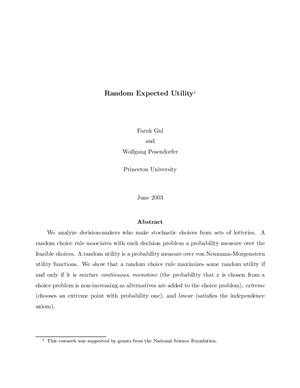Princeton University. - June 2003
Abstract Article:
We analyze decision-makers who make stochastic choices from sets of lotteries. A
random choice rule associates with each decision problem a probability measure over the
feasible choices. A random utility is a probability measure over von Neumann-Morgenste
utility functions. We show that a random choice rule maximizes some random utility if
and only if it is mixture continuous, monotone (the probability that x is chosen from a
choice problem is non-increasing as alteatives are added to the choice problem), extreme
(chooses an extreme point with probability one), and linear (satisfies the independence
axiom).
Abstract Article:
We analyze decision-makers who make stochastic choices from sets of lotteries. A
random choice rule associates with each decision problem a probability measure over the
feasible choices. A random utility is a probability measure over von Neumann-Morgenste
utility functions. We show that a random choice rule maximizes some random utility if
and only if it is mixture continuous, monotone (the probability that x is chosen from a
choice problem is non-increasing as alteatives are added to the choice problem), extreme
(chooses an extreme point with probability one), and linear (satisfies the independence
axiom).

